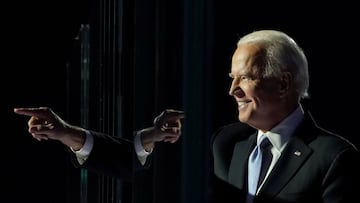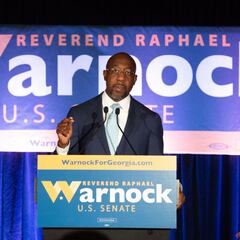Biden and unemployment benefits: what the new presidency could mean for the US
Congress could pass more coronavirus relief before the end of the year now that the presidential election is over. The bill may be smaller if Republicans keep control of the Senate.

There is renewed hope that Congress may pass more coronavirus relief before the end of the year now that the presidential election is over. The bill, however, could be smaller if Republicans keep control of the Senate, even though president-elect and Democrat Joe Biden is the country's new leader, according to experts.
“A divided government, with Democrats controlling the White House and Republicans the Senate, is likely to mean a smaller fiscal stimulus package than had been anticipated,” said Mark Haefele, chief investment officer at UBS Global Wealth Management. Control of the Senate by Republicans is still not a certainty though.
Unemployment benefits have proved to be a major sticking point during negotiations over a new stimulus package in recent months. Trump and the Republicans have accused the Democrats of demanding too much federal funding for their plans. In response, Leader of the House Nancy Pelosi has accused the GOP of aiming too low on welfare.
Trump signed an emergency executive order in August to provide short-term funds to be used for unemployment benefits but those $300 payments have since run out. Negotiations between Trump, Pelosi and Senate Majority Leader Mitch McConnell have, perhaps unsurprisingly, seen little movement in recent weeks.
Biden presidency with Republican Senate
Deutsche Bank have predicted that a Joe Biden presidency would lead to the most generous stimulus package and see an additional $2 trillion stimulus package passed which could boost the economy and lower the unemployment rate by almost two percentage points. A Biden presidency with a Republican-held Senate is ranked as the worst possible outcome for the those waiting for financial support. "With control of the Senate possibly not determined until January, there could be a prolonged period of uncertainty about fiscal policy prospects following the election," Deutsche Bank said.
House Democrats are targeting a $2.2 trillion package. Senate Republicans introduced a smaller $500 billion spending package that included aid for small businesses and federal unemployment benefits, but Democrats blocked it after the measure omitted $1,200 stimulus checks and aid for states.
Doubts over next package including stimulus checks
UBS analysts expect a deal of up to $1 trillion, down from a $2 trillion stimulus package that was expected if the Democrats had captured a majority in the Senate. The aid, however, is likely to include the essentials to a recovery - increased unemployment benefits and additional funds for struggling small businesses under the Paycheck Protection Program. UBS analysts said. It's unclear if the next package would include stimulus checks.
Senate Majority Leader Mitch McConnell said he supported Congress passing a new stimulus package before the end of the year instead of January, as he previously stated. He also noted the 'possibility' that such a bill "will do more for state and local governments".
McConnell, the top Republican in Congress, did not say why he was now accelerating that timetable. "I think that's job-one when we get back, hopefully with a more cooperative situation than we had," before the election. He added that another top priority of Congress' work session that begins next week and could extend into December, is the passage of legislation to fund government functions beyond 11 December, when existing money expires.
McConnell: "Do it before the end of the year"
"I think we need to do it and I think we need to do it before the end of the year," McConnell said in a news conference on Wednesday. "I think now that the election is over, the need is there and we need to sit down and work this out."
For months, @HouseDemocrats have fought to deliver relief for American families — and yet President Trump and Congressional Republicans have refused to work with us to put #FamiliesFirst. #MSNBCLive pic.twitter.com/bvIGq22S9D
— Nancy Pelosi (@SpeakerPelosi) October 28, 2020
House Speaker Nancy Pelosi rejected McConnell's call for a narrow bill. She has been working with Treasury Secretary Steven Mnuchin to strike a deal near $2 trillion. “It doesn’t appeal to me at all, because they still have not agreed to crush the virus. If you don’t crush the virus, we’re still going to have to be dealing with the consequences of the virus,” Pelosi said in a news conference.
Ryan Sweet, senior director of economic research at Moody’s, told NBC News: "The hard part is associated with the improvement in the economy, and now that we have no fiscal stimulus coming until after inauguration, you could start to see [jobless] claims creep back up, especially if we see layoffs in leisure and hospitality and airlines."
Several industries affected by pandemic
Related stories
Boeing have recently announced that they will have to cut 11,000 additional jobs over the next year, while other airlines and businesses in the hospitality sector have also warned of the dangers of receiving no financial aid.
Some US analysts are concerned about the viability of a stimulus package after both parties failed to strike a deal in recent months. “There’s going to be a lot of hard feelings between Republicans and Democrats coming out of this election,” said Andrew Mies, chief investment officer at 6 Meridian. “If things are more of the same in Congress, does that mean we’ll continue to have a stalemate with the stimulus package?"

